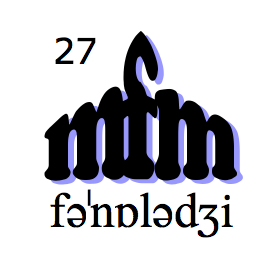 |
The 27th
Manchester Phonology Meeting |

|
With a special session entitled
featuring Claire Moore-Cantwell, Jennifer L. Smith and Jochen Trommer
|
|
Thursday 23rd - Saturday 25th May 2019 Held in Manchester, England. Organised through a collaboration of phonologists at the University of Edinburgh, the University of Manchester and elsewhere. For information about the mfm and its history and background, see the mfm homepage. |
Teaching phonology: the state of the art
organised by Yuni Kim, Elisabeth Zsiga and Patrick Honeybone.

programme
|| travel and accommodation
|| booking ||
organisers

The full programme for the 27mfm (with scheduling for presentations and some practical information) is available here:
The abstracts booklet is available here:
The list of participants in the conference is here:
Registration
for the mfm will begin at the conference venue at 11.30
on
Thursday 23rd
May and the conference will finish around 5.00pm on Saturday 25th May.
We will be at UMIC (the University of Manchester Innovation Centre).
(Don't forget, if you have been to the mfm before, that this is BIG NEWS: we will not be at Hulme Hall, as was the case in previous years.) Details of how to find UMIC are on the travel page.
If you're in Manchester on the 22nd May, do come to the Fringe Workshop on Teaching phonology: the state of the art. Note that the two events are happening a different venues.
Notes for poster-presenters: The poster displays will be set up late in the afternoon before each poster session. You will be allocated a poster board with these dimensions: 210cm high x 120cm wide. Each person presenting a poster will be provided with the means to affix their posters to the display board. Please feel free to bring handouts with you, so that those viewing your poster also have something to take away. Posters in previous years have taken a wide variety of forms, and there is no one single way to produce a good poster; the important things are that the font size is not too small, that it is easily readable and does not have too much text on it, that it sets out the main points that you want to argue for clearly, and maybe that it's eye-catching, too. Our advice is: don't have too much text, and do include diagrams or other graphics as they can be easier for an audience to take it. Some presenters bring one big poster which takes up all the space (do note the dimensions of the poster board given above if you do this), others bring a series of A3 or A4 sheets of paper which can be fitted together on the poster board. During your poster session, you will be asked to stay by your poster (for at least a fair amount of the session) as other conference participants go around the displays, read your poster and ask you questions about it.

Detailed information on accommodation possibilities and on how to get to the conference are available here. (If you have been to the mfm before, note the BIG NEWS above when you are booking accommodation: booking accommodation near Hulme Hall may no longer be sensible, although the new venue is only about 10 minutes walk from Hulme Hall)
- the travel and directions page is available here [also with links to information on Manchester and its many attractions]
- advice on where to stay in Manchester is available here

Cancellation policy: we will endeavour to refund any fees paid if you cancel by 17th May. Any cancellations after 17th May may not able to be fully refunded as we will have committed to certain payments on your behalf.

Is there lexically-specific phonology?
Invited speakers
Invited discussant

Organisers
Organising
Committee
The first named is the
convenor and
main organiser - if
you have any queries about
the
conference, feel free to get in touch (patrick.honeybone@ed.ac.uk).
 Patrick
Honeybone (University
of Edinburgh)
Patrick
Honeybone (University
of Edinburgh)
 Ricardo
Bermudez-Otero (University
of Manchester)
Ricardo
Bermudez-Otero (University
of Manchester)
 Patrycja
Strycharczuk (University
of Manchester)
Patrycja
Strycharczuk (University
of Manchester)
Treasurer
 Michael Ramsammy
(University of Edinburgh)
Michael Ramsammy
(University of Edinburgh)
Advisory
Board Adam
Albright
(MIT) Adam
Albright
(MIT) Jill
Beckman (Iowa) Jill
Beckman (Iowa)  Stuart
Davis (Indiana) Stuart
Davis (Indiana)  Laura
J. Downing (Gothenburg) Laura
J. Downing (Gothenburg) Silke
Hamann (Amsterdam) Silke
Hamann (Amsterdam) S.J.
Hannahs (Newcastle upon Tyne) S.J.
Hannahs (Newcastle upon Tyne)  Kristine
A.
Hildebrandt (Southern Illinois) Kristine
A.
Hildebrandt (Southern Illinois) Yuni
Kim (Essex) Yuni
Kim (Essex) Martin
Kramer (Tromso) Martin
Kramer (Tromso)  Nancy Kula
(Essex) Nancy Kula
(Essex)  Nabila Louriz
(Hassan II, Casablanca) Nabila Louriz
(Hassan II, Casablanca)  Joan
Mascaro (UAB) Joan
Mascaro (UAB) Kuniya
Nasukawa (Tohoku Gakuin) Kuniya
Nasukawa (Tohoku Gakuin) Marc
van Oostendorp (Meertens &
Nijmegen) Marc
van Oostendorp (Meertens &
Nijmegen) Tobias
Scheer
(Nice) Tobias
Scheer
(Nice)  James M.
Scobbie (QMU) James M.
Scobbie (QMU) Koen
Sebregts (Utrecht) Koen
Sebregts (Utrecht) Jennifer
L. Smith (UNC Chapel Hill) Jennifer
L. Smith (UNC Chapel Hill) Nina Topintzi
(Thessaloniki) Nina Topintzi
(Thessaloniki) Jochen Trommer
(Leipzig) Jochen Trommer
(Leipzig) Francesc
Torres-Tamarit (Paris
8) Francesc
Torres-Tamarit (Paris
8) Christian
Uffmann (Duesseldorf) Christian
Uffmann (Duesseldorf) Ruben
van de Vijver (Duesseldorf) Ruben
van de Vijver (Duesseldorf) Sophie
Wauquier (Paris 8) Sophie
Wauquier (Paris 8) Draga Zec (Cornell) Draga Zec (Cornell) Elizabeth Zsiga (Georgetown) Elizabeth Zsiga (Georgetown) |
Organisatory Helpers Massimiliano Canzi (Manchester) Massimiliano Canzi (Manchester) Georges Sakr (Edinburgh) Georges Sakr (Edinburgh) Kaiyue Xing (Manchester) Kaiyue Xing (Manchester) |

The site is hosted
by the Department
of
Linguistics and English Language at the University of
Edinburgh.
Page created by Patrick
Honeybone
Last updated February 2021